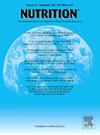Acute inflammatory and metabolic effect of high fructose intake in normal-weight women: A randomized, double-masked, crossover trial
IF 3.2
3区 医学
Q2 NUTRITION & DIETETICS
引用次数: 0
Abstract
Objectives
We aimed to evaluate the acute effect of a fructose-rich single meal on metabolic and inflammatory biomarkers
Research Methods and Procedures
This single-center, double-masked, randomized crossover trial recruited females aged 20 to 47 with a normal body mass index and was conducted at Hospital das Clínicas (Belo Horizonte, MG, Brazil). Participants received a standardized meal with either sucrose, glucose, or a fructose overload. Blood samples were collected after overnight fasting (baseline) and at 30, 60, 120, and 240 minutes postprandial. Serum levels of glucose, triglycerides (primary outcome), total cholesterol, alanine aminotransferase, aspartate aminotransferase, adiponectin, leptin, resistin, interleukin (IL)-2, IL-4, IL-5, IL-6, IL-10, IL-17, interferon-gamma, tumor necrosis factor, eotaxin, and total blood leukocytes were measured.
Results
This trial was completed with 25 enrolled participants, and three dropped out. The per-protocol analysis included 22 participants. As expected, postprandial glycemia increased 30 minutes after consuming meals rich in sucrose (P = 0.045) or glucose (P < 0.001). Triglyceride and leucocyte concentrations increased only at 240 minutes after consuming a high-fructose meal (P < 0.05). Regardless of the type of carbohydrate overload, leptin concentrations decreased postprandially compared to baseline at all time points (P < 0.05). Four participants reported adverse events after consuming the standardized meal with glucose or fructose, including nausea and malaise.
Conclusions
Our findings indicate that a fructose-rich single meal leads to a more significant increase in triglyceride and leukocyte concentrations compared to glucose and sucrose in healthy women. These findings support concerns regarding the potential inflammatory and metabolic dysfunction associated with frequent consumption of high-fructose meals.
正常体重女性摄入高果糖对急性炎症和新陈代谢的影响:一项随机、双掩蔽、交叉试验。
研究目的我们旨在评估富含果糖的单餐对代谢和炎症生物标志物的急性影响 研究方法和程序:这项单中心、双掩蔽、随机交叉试验招募了 20 至 47 岁、体重指数正常的女性,在 Clínicas 医院(巴西 MG 州贝洛奥里藏特市)进行。参加者食用了含蔗糖、葡萄糖或果糖过量的标准化膳食。在一夜空腹后(基线)以及餐后 30、60、120 和 240 分钟采集血样。测量血清中葡萄糖、甘油三酯(主要结果)、总胆固醇、丙氨酸氨基转移酶、天门冬氨酸氨基转移酶、脂肪连素、瘦素、抵抗素、白细胞介素(IL)-2、IL-4、IL-5、IL-6、IL-10、IL-17、γ-干扰素、肿瘤坏死因子、共济失调素和全血白细胞的水平:该试验共有 25 人参加,3 人退出。按协议分析包括 22 名参与者。不出所料,在进食富含蔗糖(P = 0.045)或葡萄糖(P < 0.001)的膳食 30 分钟后,餐后血糖会升高。只有在进食高果糖餐后 240 分钟,甘油三酯和白细胞浓度才会增加(P < 0.05)。无论碳水化合物超载的类型如何,餐后瘦素浓度在所有时间点均较基线下降(P < 0.05)。四名参与者在食用葡萄糖或果糖标准化膳食后出现了不良反应,包括恶心和不适:我们的研究结果表明,与葡萄糖和蔗糖相比,富含果糖的单餐会导致健康女性甘油三酯和白细胞浓度的显著增加。这些研究结果支持了人们对频繁食用高果糖膳食可能导致炎症和代谢功能障碍的担忧。
本文章由计算机程序翻译,如有差异,请以英文原文为准。
求助全文
约1分钟内获得全文
求助全文
来源期刊

Nutrition
医学-营养学
CiteScore
7.80
自引率
2.30%
发文量
300
审稿时长
60 days
期刊介绍:
Nutrition has an open access mirror journal Nutrition: X, sharing the same aims and scope, editorial team, submission system and rigorous peer review.
Founded by Michael M. Meguid in the early 1980''s, Nutrition presents advances in nutrition research and science, informs its readers on new and advancing technologies and data in clinical nutrition practice, encourages the application of outcomes research and meta-analyses to problems in patient-related nutrition; and seeks to help clarify and set the research, policy and practice agenda for nutrition science to enhance human well-being in the years ahead.
 求助内容:
求助内容: 应助结果提醒方式:
应助结果提醒方式:


